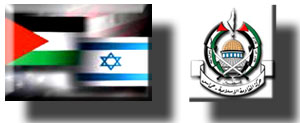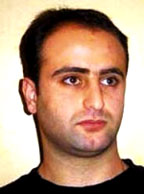FCNNEWSSOURCE

On January 25, the Islamic Resistance Movement, Hamas won 76 seats of the 132-seat Palestinian Legislative Council in a landslide victory over the ruling Fatah party. The Final Call explores three differing viewpoints that provide insight into the volatile mixture of ideas and attitudes in a region characterized by unpredictability and conflict since Israel’s creation in 1948.]
- Publisher: ‘Palestine could become rallying point of oppressed people’ (FCN, 2-16-2006)
- Professor: ‘Israel and the United States are mostly to blame’ for Hamas victory (FCN, 2-16-2006)
Fayyad Sbaihat is an outspoken activist and lead organizer with the Palestine Solidarity Movement (PSM) coordinating efforts to establish the right of return for Palestinians displaced by the Israeli government’s historical land grabs.
FC: What are your thoughts on the clear landslide victory by Hamas?

FS: It is definitely a great exercise in democracy that amounts to a political revolution. It brought to an end unchecked, one-party rule and established the basis for a pluralistic political society. The margin of the Hamas win was surprising. This leaves Hamas with a bigger challenge, as the expectations from them are very high and of having to run a government instead of being part of a coalition government, transforming from a militant group into a political party. Hamas is no longer the rash militia that can afford to menace Israel with violence and make it difficult for the Palestinian Authority to maintain law and order.
FC: Were the results a vote for Hamas and against the current Palestinian Authority leadership, or a demonstration against the American/Israeli alliance in foreign policy?
FS: It is my belief that the Palestinian electorate cast their vote on the issue of reform vs. corruption more so than war vs. peace. There is a significant amount of distrust towards Fatah due to the perceived rampant corruption among its ranks, which spilled over to the Palestinian Authority’s institutions and bureaucracies, as well as the inability to deliver anything in the past decade.
The vast majority of Palestinians remain in favor of moving forward in the quest for peace, despite their disillusion with the ‘peace process’ that has so far been more about the process than it was about peace. There will be as much peace as Israel will allow. It did not allow for a serious peaceful settlement when Fatah was in power. So on this level, Palestinian voters did not think they where going to lose much allowing Hamas control of the parliament, however unpopular with Israel it may be.
A vote of protest against the failure of the peace process primarily because of the blind alliance between U.S. and Israel may have played a role in casting a vote to the party this alliance proclaims as the enemy of the peace process.
FC: Likud leader Benjamin Netanyahu was quoted by the Jerusalem Post as stating: “Before our very eyes, Hamastan has been created.” What do the results portend for the Israeli government, especially given the instability and poor health of Ariel Sharon of the Kadima party?
FS: Recent polls indicate that more than half of all Israelis are in favor of holding talks with a Hamas-led government, but historically the Israeli public was more for peace than its traditionally military governments. Given the upcoming Israeli elections, Likud and other parties may attempt to employ the fear of the “Hamas factor” to push the Israeli electorate to the right. If that succeeds and Likud wins, we will enter a stalemate, as Benjamin Netanyahu is the least likely of the Israeli candidates to hold talks with the Palestinians, and most likely to resort to crushing force. If Kadima or Labor wins, there may be more openness on the Israeli side towards talks.
FC: Can you clarify the “two state” solution that is supposedly being advocated by George Bush, why it seems plausible to some and opposed by others?
FS: Those who call for a two-state solution mean two independent states, Jewish Israel and Arab Palestine, within the borders of historic, British-mandated Palestine. It is a most popular solution called for by the majority of Palestinians, Israelis and third party observers.
Traditionally, the thought was for a Palestinian state to be established on ALL of West Bank, Gaza Strip and East Jerusalem, with a free, secure passage between the two geographic areas. Recently, this definition has become more vague, and the borders of the two states have become elusive, and continue to grow more so as Israel pushes forth with its unilateral efforts of building walls, annexing lands, constructing settlements and tightening the grip on Palestinian ports, effectively redrawing the border, and by stealing much of the West Bank.
Conveniently, peace process brokers such as the U.S. government and the Quartet [the U.S., European Union, Russia and the United Nations] have stopped referring to defined or clear borders when speaking of the two-states solution, implicitly adopting Israel’s unilateral border drawing. Furthermore, the Israelis have stated their intention to retain control of all the border points of entry, land or sea, thereby restricting the free movement of Palestinians and preventing them from establishing an independent economy.
The opposition to the two-state solution is growing, and those objecting are doing so due to their belief that the current situation does not offer a viable or sovereign Palestinian state, and it still is not the best option, as it does not fulfill Palestinians’ legitimate rights–from access to all of their land to right of return.
FC: Where does this leave Palestinian Authority President Mahmoud Abbas?
FS: Abbas’s position cannot be envied. At best, he will rule a government that has a different political agenda than his own. This will be a difficult, but not impossible task. The other scenario, however unlikely, is that Hamas would continue with its hard line politics. in this case, Abbas will most likely be left in a power struggle with the Hamas government, the magnitude of which remains to be seen. The disparities between their goals and rhetoric will determine the dynamics of that relationship. However, a Hamas-led government is smarter than making an enemy of Abbas, where it would place itself between the president’s power from the top, and the security forces whose ranks are filled with Fatah loyalists from the bottom.
Furthermore, Hamas recognizes that Abbas is the Palestinian government’s lifeline on the international level, and they will seek close relations with him due to their understanding of the importance of diplomacy and relations with the international community.
FC: Will Hamas be forced to back down on some of the more strident rhetoric and positions towards Israel?
FS: I think there likely will be efforts to push Hamas to revise its charter and tune down its rhetoric and even come out explicitly in recognition of Israel. While this may seem like a transformation, it is merely an atmosphere of realpolitik. Hamas’ victory is larger than it expected, and this presents it with the dilemma of living up to the diplomatic and political expectations of a government. Hamas understands that they just got great power, and with that comes great responsibility.
It will do what serves the Palestinian public more, and they understand that alienating much of the world is not to their advantage, especially when the potential allies they counted on, from Arab states to Iran, are too powerless to help. If Hamas cannot pay the government employee salaries, it will not last in government more than few months, so they need the western donor countries.
The U.S. will likely soften its tone, and review its stance on Hamas. The international community will take a few weeks to absorb the results, but will understand their best option is to meet Hamas halfway. Israel may even find itself in a position having to do the same. Remember, the African National Council (ANC) was once a terrorist group. The Palestinian Liberation Organization (PLO) was considered terrorist by the U.S. not too long before Arafat stood with Bill Clinton on the lawn of the White House.
FC: Thank you.
Interviews conducted by Final Call Online
Correspondent Ashahed Muhammad












